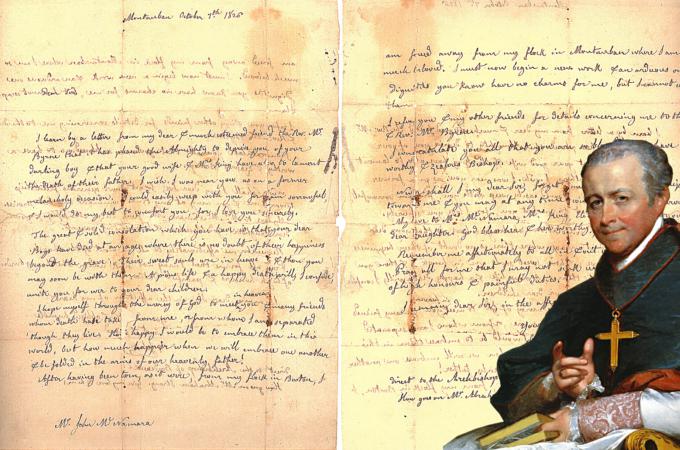'High honours and painful duties' -- Cheverus' letters
Last year, an exhibit at the Pastoral Center in Braintree highlighted the correspondence between the then Father John Cheverus and the Hanly Family of Bristol, Maine. What the letters revealed was the personal relationship that developed between Cheverus and the family following their first meeting in 1797, and continued throughout his time in Boston.
Within the archive are similar examples which demonstrate the personal level at which Cheverus interacted with his congregation, and which no doubt contributed to his veneration by both Catholics and non-Catholics alike during his time here. A letter to John McNamara of Boston, dated October 7, 1826, is one of these examples which demonstrates the close personal relationships he developed.
In the first half of the letter, Cheverus expresses his sympathy and attempts to console McNamara over the recent loss of his son and father-in-law. By this time, Cheverus had been in France for nearly three years, and his knowledge of, and response to, these personal events speaks to his continued and sincere interest in the wellbeing of his congregation.
He references what must be the death of another son, at which time he was present to mourn with the family, writing that "I could easily weep with you for I am sorrowful, and I would do my best to comfort you, for I love you sincerely." He continues that "your dear Boys have died at such an age where there is no doubt of their happiness beyond the grave, their sweet souls are in heaven..."
He offers further words of comfort by expressing that a pious life will lead McNamara to heaven, where he will be with his sons once more. Cheverus also comments on his own hope that God will find him worthy of heaven, so that he will once more see all of those friends and family whom he has lost.
Earlier in October, Cheverus was appointed Archbishop of Bordeaux. The latter part of the letter addresses this new role and, interestingly, he expresses some reluctance towards it. He reveals to McNamara that "after having been torn, as it were, from my flock in Boston, am forced away from my flock in Montauban where I am so much beloved. I must now begin a new work and an arduous one..."
For someone who thrived on personal relationships with his "flock," it must have been difficult to leave them, and especially for the second time in a short time. Although it meant a promotion of sorts, his words reveal the dilemma that many have probably faced in their own lives -- whether it be a clergy member leaving a parish to become an administrator, or a teacher becoming the principal of a school -- sometimes sacrifices have to be made to follow our calling and make the most of our abilities.
Cheverus ends his letter highlighting his reluctance, asking "Pray all for me that I may not wilt under the heavy burden of high honours and painful duties."
THOMAS LESTER IS THE ARCHIVIST OF THE ARCHDIOCESE OF BOSTON.



















